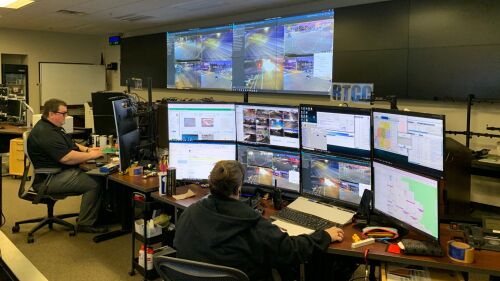Agency name: Spokane County Sheriff’s Office (SCSO)
Agency size: 275 sworn deputies
Population served: 550,000
Date RTCC launched: RTCC launched and began assisting patrol officers in January 2023. First full-time RTCC Tactical Analyst (Operator) began April 1, 2024. Now has four employees. Hours: Initially Tuesday-Friday 1200-2200. Once fully staffed: Monday-Saturday 0800-1600 (M-F), 1400-2200 (T-F), and 1600-0200 (W-Sat).
Typical calls RTCC responds to: The full range of calls received by 911, such as possession of stolen vehicles and property, assault, theft, burglary, drive-by shootings, child luring and murder, among others.
The challenge: Doing a better job of solving crimes
Known for its natural beauty, outdoor recreational activities, and rich local culture, Spokane County is unfortunately fighting a higher crime rate than the national average. This is why the Spokane County Sheriff’s Office (SCSO) launched a Real Time Crime Center (RTCC) enabled by Flock Safety technology. The RTCC is located in the Public Safety Building in Spokane, Washington.
“Prior to opening the RTCC, the SCSO had taken on many different technology systems and software to address crime,” said Lt. Justin Elliott, Commander of the SCSO’s Investigative Intelligence Division. “Having done so, we found over that time that we haven’t been adequately leveraging all of which we were purchasing and possessing to increase that efficiency and public safety. That’s why we decided to consolidate and rationalize everything that we were trying to do into an integrated RTCC model.”
The solution: Spokane County’s RTCC
According to the SCSO’s RTCC website, the RTCC operators monitor and analyze inputs from a wide range of data sources such as surveillance cameras, license plate readers, computer-aided dispatch systems, social media, live 911 calls and other law enforcement information systems in real-time to create a real time overview of crime in their jurisdiction. Armed with this overview these operators collaborate and communicate with deputies/detectives and other law enforcement partners in the field, providing them with vital information to respond quickly and effectively to incidents as they unfold. Its primary functions include incident response, crime prevention, resource allocation and community engagement.
To make this happen, “we have incorporated Flock Safety’s Wing VMS video management system and Flock Safety Falcon license plate readers into the RTCC, plus live feeds from drones, helicopters, and officer body cameras,” said Lt. Elliott. “Using FlockOS public safety platform, these sources are combined with investigative and map overlay software, along with a national stolen property database, to support the RTCC’s fast response to incidents as they unfold. We also integrate data from other agencies to improve our investigative process and share information with them and our officers in the field.”
When it comes to data-sharing, the SCSO’s RTCC does so on a case-by-case basis. “This is because we are constantly checking that our sharing of information is always in compliance with department policy, plus local and state laws,” Lt. Elliott said.
Establishing an RTCC wasn’t a slam dunk for the SCSO. “To make it happen, we had to get buy-in from our stakeholders and keep in constant communication with them, because that buy-in made them part of the team,” said Lt. Elliott. “After all, you need many people to back this kind of initiative for it to be successful, because nobody can do it on their own. We also needed to work within grant program budgetary restrictions, and be able to pivot when things changed. So we did, and we got the RTCC built.”
Delivering measurable results
One of the biggest stressors for any law enforcement leader is to prove the return on investment for public money spent to fight crime. Fortunately for the SCSO’s RTCC, such results are measurable, recordable and documented for all to see.
An SCSO document titled “Charges/Warrants as a Result of Flock/RTCC,” spells out what taxpayers have received for their money. Since the start of 2023 to May 2024, the RTCC has helped with the arrest/charging of 150 people, recovering 88 stolen vehicles and 23 stolen plates, averted 33 dangerous situations, and located 9 missing personas, among others.
“In Spokane, our RTCC operators are so valuable that they have become valued members of our law enforcement team,” concluded Lt. Elliott. “Communication between them, our commanders and our officers is constant. Meanwhile, when it comes to cases cleared, we’ve had over 200 success stories since the beginning of 2023 where we started tracking them. Clearly, opening an RTCC is one of the best decisions we’ve ever made.”











